In addition to the filmed report from Hebron shown on BBC television news programmes on October 30th, Yolande Knell also produced a similar audio report which was broadcast on the BBC World Service radio programme ‘Newshour’ (available here from 37:15).
Like the filmed version, that audio report promotes the notion that Israelis living in Hebron are ‘illegal settlers’ – despite the signing of the 1997 “Protocol Concerning the Redeployment in Hebron” by Palestinian representatives.
Failing to explain the context to the picture she portrays, Knell tells listeners:
“Hebron is unique in the West Bank because it’s divided. Part is under full Palestinian control and the other part […] is under full Israeli control.”
“The soldiers are here right in the heart of the Old City because just along here there are families of Jewish settlers.”
“A few hundred Israelis live here in the occupied part of Hebron and about 40,000 Palestinians. The settlers’ presence here is seen as illegal under international law but Israel doesn’t agree.” [emphasis added]
It is of course Knell’s failure to clarify to listeners that the existing arrangements in Hebron are the result of an agreement between Israel and the PLO which allows her to promote the politically motivated narrative of an “occupied part of Hebron”.
That narrative is also advanced by her interviewee Issa Amro, who is once again inadequately introduced as “a local activist”, with no effort made to comply to BBC editorial guidelines on impartiality by clarifying his political affiliations and agenda.
In common with the filmed item, Knell’s radio report is notable for the fact that it too provides backwind for the Palestinian propaganda seen in recent weeks which attempts to portray terrorists as ‘innocent victims’.
“As violence has flared in the past few weeks there’ve been a lot of stabbings and alleged stabbings of Israelis by Palestinians in and around Hebron. There’s a big poster being held up here showing all the young Palestinians from the city who’ve been shot and killed as a result. We’re going to meet the mother of one of them. Twenty year-old Saad al Atrash is said to have tried to stab an Israeli soldier.” [emphasis added]
Saad al Atrash is “said to have tried to stab an Israeli soldier” because that is exactly what he did on October 26th – but those listening to Knell’s account would not be sure of that.
The same theme is also promoted by host Owen Bennett-Jones in both his introduction and closing remarks, providing an opportunity to examine what the BBC sees fit to describe as “alleged” and what it is comfortable portraying as fact.
In his introduction, Bennett-Jones tells listeners: [emphasis added]
“At least twenty Palestinians from Hebron have been shot dead in attacks and alleged attacks.”
At the end of the item Bennett-Jones says:
“Now to bring you up to date, there have been protests across the West Bank again today, including in Hebron. In Bethlehem an eight month-old baby living close to the site of clashes died of tear gas inhalation. Earlier, Israeli police said they shot dead a Palestinian who’d tried to carry out the first stabbing attack in Jerusalem in two weeks. In Nablus, two Palestinians allegedly tried to stab members of the Israeli security forces near a checkpoint. Both were shot – one died and one was wounded.” [emphasis added]
The death of a baby, supposedly due to tear gas inhalation, is presented to BBC audiences as fact even though investigation showed that claim from the Palestinian Authority’s Ministry of Health to be unfounded and Palestinian doctors dismissed the claim, saying that the infant had an existing health problem which was described by relatives as a birth defect.
An attack in Jerusalem in which a man was moderately wounded by a terrorist with a knife is presented to listeners as an attempted attack.
An incident at Tapuach Junction in which two Palestinians arrived at the scene on a motorbike and then approached a Border Police officer whilst wielding knives is portrayed as ‘alleged’.
This narrative-driven selective framing is obviously not conducive to meeting the BBC’s professed standards of accuracy and impartiality and does not contribute to meeting its remit of enhancing audience understanding of the story.




